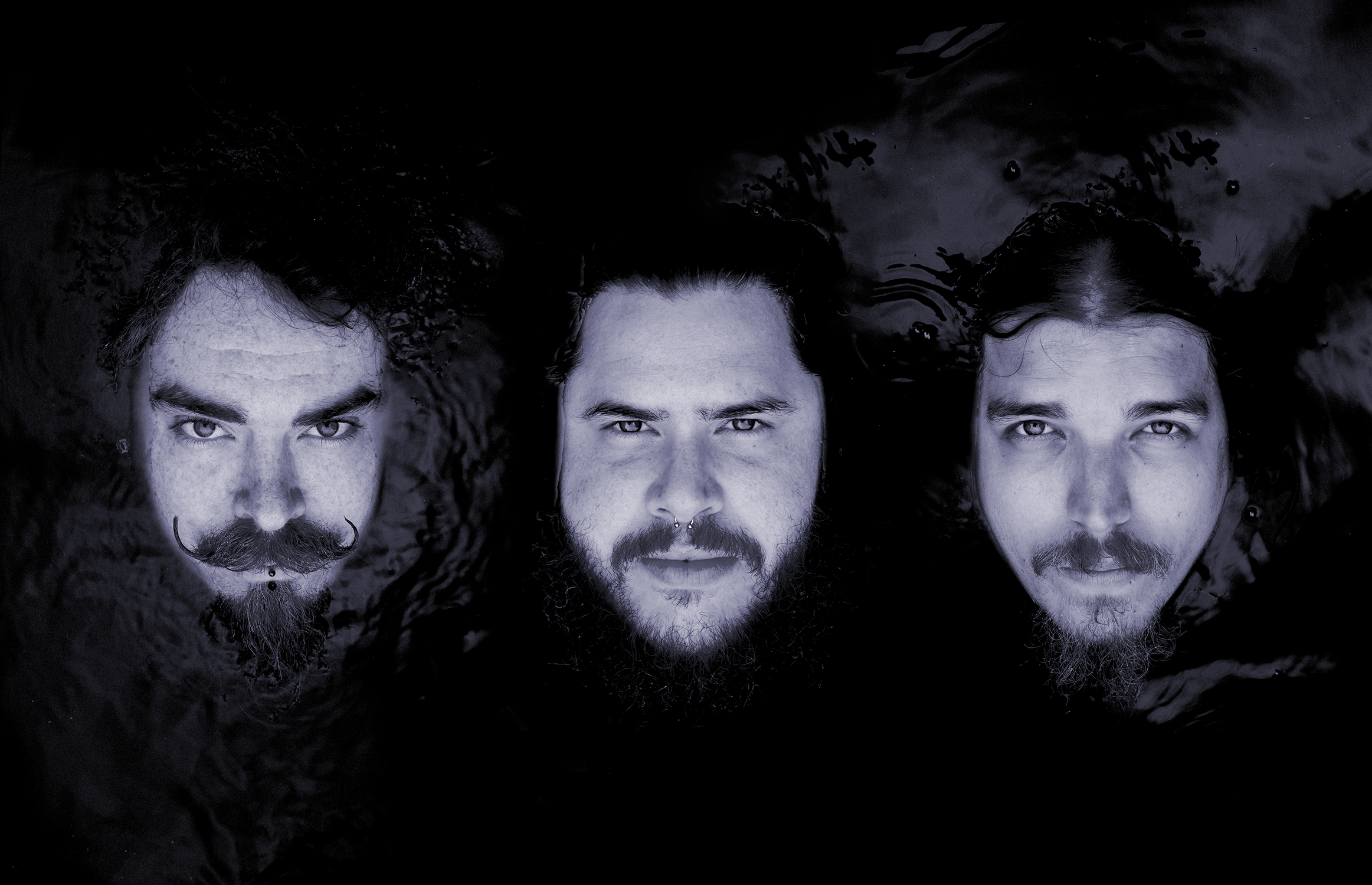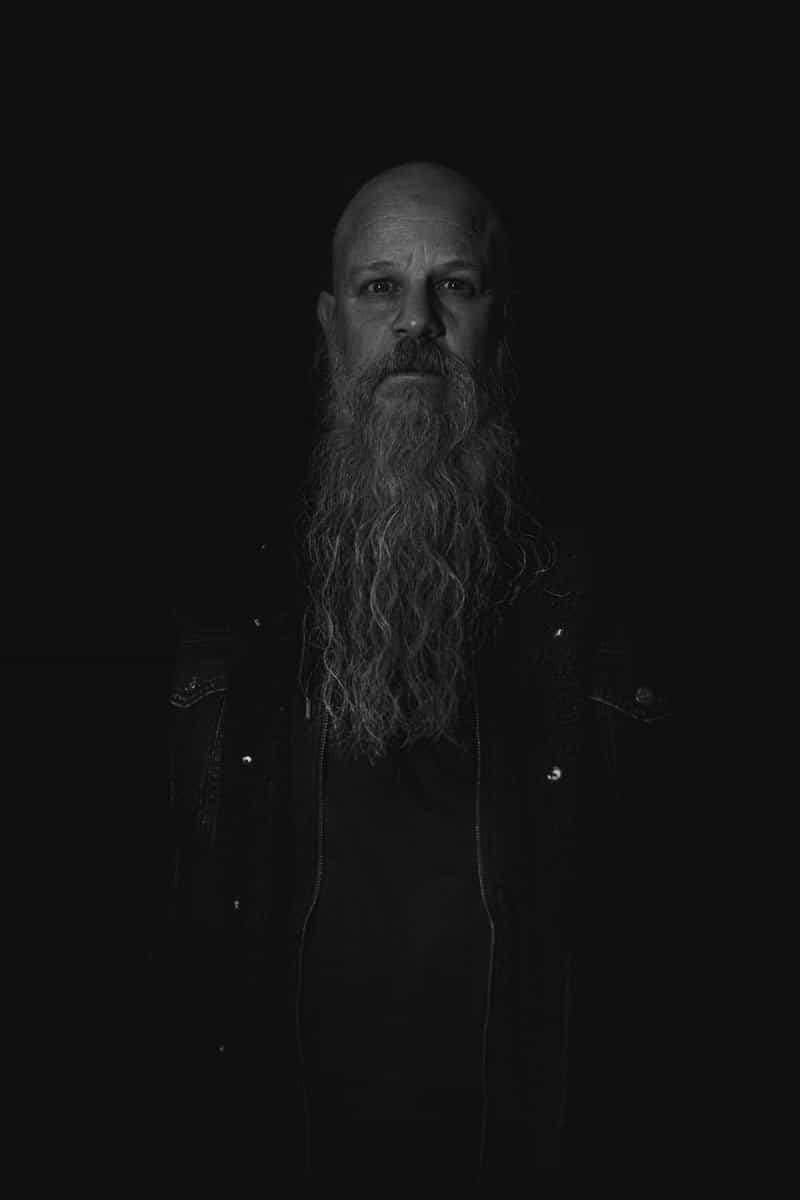BAST Interview

There are only three people now who can guide you how to measure the tiniest space between the atoms and the different points in the space – BAST. Moreover they will inspire you with their uncompromising progressive search into the unknown beyond this space. So that you are going to sit stunned, holding your breath, mesmerising into the darkest matter flowing around, until you disappear. Prepare yourself to dive in to the far horizons, beyond the distant suns. The beckoning void is calling your name. Craig – one third of BAST was too kind to accept our invitation and to tell us more about the red line through the black which the band is drawing with persistance, so to leave their blueprint in the invisible for the human eyes distances.
– Hello Craig, and welcome to Blessed Altar Zine! Ten years, ten tracks, two albums – how do you feel?
– We recorded our second album at the beginning of the year, and I’ve spent the best part of the following 8 months stowed away illustrating and curating the artwork, so it’s energising to finally interact with the physical piece. We’ve also just returned from a spate of shows for the first time in quite a while, which has provided a welcome sense of renewal.
– What was the beginning for Bast?
– The seed that would develop into Bast proper was planted around a decade ago, when myself and cofounder Jon began jamming as a two-piece after a string of failed and underdeveloped projects. We didn’t have much of a mission statement prepared, or a definite direction, but we cobbled together a demo that would mark a loose, unconscious blueprint for what the band would eventually become. After a few tragic performances and a slew of members, we didn’t get serious until the induction of Gavin in 2012
 – What does “Bast” actually mean – literally and metaphorically? What is the message you wanted to leave with BAST?
– What does “Bast” actually mean – literally and metaphorically? What is the message you wanted to leave with BAST?
– ‘Bast’ comes from Neil Gaiman’s canon of work, inspired by his depiction of the Egyptian Goddess of the same name. Around the time of our band’s inception, both Jon and I were reading a book involving its namesake, and required something – anything – for our first supporting slot. I don’t recall if we ever planned for it to be a permanent solution, but evidently, it stuck.
– Congratulations on your new gorgeous Nanoångström album! Could you please tell us more about it? What does it explore stylistically and thematically?
– Many thanks! Stylistically we adopted a similar tact to our first album – exploring narrative arrangements using the genres which interest us like colours of a palette, treating each song like a chapter in the story. Thematically however, it’s almost the reverse of Spectres, insomuch as the former begins with fear and isolation, ever building towards a grand revelation. This time around, we start with a sense of hopefulness, and descend toward despair, loss and grief.
– Distant suns, far horizons, beckoning void, ghosts in the space between the stars…- the albums is full time and space passages…
– While the aforementioned themes of loss, grief, and hopelessness may sound like mere tropes of our respective genre leanings, the narrative of Nanoångström engages with these themes quite literally – concerning change and loss in the wake of time’s dilation (akin to Event Horizon and the literary works of Iain. M. Banks, Dan Simmons, and Kurt Vonnegut), as well as physical and spiritual isolation amongst the desolate surroundings of space, inspired by such cinematic classics as Alien, 2001: A Space Odyssey, etc.
– Can you expand a bit what actually “Nanoångström” means as well?
– An Ångström (Å) is one ten-millionth of a millimetre – a rare measurement used to calculate atomic distances. A Nanoångström is theoretically a further billionth of this minuscule expanse. We wanted this to signify an almost instant passage between two different points in space, a concept that is further reinforced in both the album’s artwork and lyrics, particularly those of the title track.
 – Why did it take 4 years for you to release this record? Nanoångström is a very dense, multilayered record soundwise. It seems you do care a lot about small details and and the proper sound, correct?
– Why did it take 4 years for you to release this record? Nanoångström is a very dense, multilayered record soundwise. It seems you do care a lot about small details and and the proper sound, correct?
– Spectres fortunately provided us with plenty of opportunities to tour and perform at festivals, so this certainly kept us on our toes. Also, we didn’t want to begin writing immediately after Spectres’ release for fear of recycling any sub-par ideas, or being ‘too’ influenced by our previous output. We weren’t intending to throw any real curve-balls with Nanoångström, but we certainly didn’t want to tread familiar ground either; hopefully a little distance has afforded us a happy medium. Aside from this, we are fairly fastidious when it comes to piecing songs together, as well as pacing the overall arch of the album as a whole, reworking and leaving many ideas by the wayside – our writing process is very democratic in terms of what stays and what goes – unless it gets a tick of approval from all three of us, it doesn’t make the cut.
– So much diversity there and amazing mix of elements inside of it – from sad mournful moods, doom and gloom, through sludgy sticky nuances, up to frantic bursts…What is the recipe for all these so good experiments?
– Every story has its ebbs and flows, from humble beginnings to climactic finales, with every charge and retreat denoting moments of glory and misery. It seems fairly natural to use tempo, tone, vocal stylings, and other factors to reflect such a narrative journey, which in the most superficial terms, is what generally divides genres beneath the ever increasing umbrella of Metal. For me, the song Baker St. Muse by Jethro Tull is a perfect example of this – the mixture of so many elements is what progresses the arrangements so much as to resemble a time line of sorts. I suppose a prog delicacy of this nature is what we’re unwittingly moving towards, yet with heavier influences comprising the ingredients.
– What did you change in comparison to “Spectres”?
– One of the biggest – yet often overlooked – changes is the difficulty of actually performing the songs, which naturally increases alongside the complexity of the song writing. When Spectres was released, the material on that record was virtually at the brink of our ability, and the same is now true for Nanoångström. The songs are long, uncompromising, and leave very little respite for anyone to catch their breath.

– And what about the inspirations? I mean not only musically…
– Other than a smorgasbord of musical acts, from progressive rock and folk, to the more obvious metal and punk influences, cinema and literature are both huge sources of inspiration for all of us. From the pacing, tone – and in the case of the former – even the sound tracks themselves have had a huge effect of how we approach story telling. We’re all avid science fiction and horror fans, both in written and cinematic form.
– You worked together with Chris Naughton of Winterfylleth on the Beckoning Void track. How did it happen to get together and have this collaboration?
– We’ve shared the stage with Winterfylleth a few times, and we’re all quite familiar. Chris stopped by the studio to say hello, and by happenstance we were completing the vocals that day. Knowing his vocal stylings well, we suggested a couple of passages for him to lend his skills to, and we were all very satisfied with the result!
– The artwork of the new record is very interesting too. It is part of the whole message, but it is not the very typical artwork for such heavy band. Tell us more about it.
– The artwork illustrates the previously mention concept of an ‘almost instant passage between two different points in space’, using the physical format of the vinyl gatefold and digipak CD to emphasise this idea. Over the four panels, a character is depicted dissolving through an immaterial void/wall. When closed, this journey is linear, but as the gatefold is opened, these states of decay are seemingly suspended in perpetuity, existing in the same instance.
We commissioned manga legend Shintaro Kago to illustrate a piece to reflect this concept, which is present on an inner-sleeve. Conceptually, we wanted the death and deconstruction of our protagonist to look almost incidental – from a force far more passive than a violent act at the hands of man, but of the uncaring, instantaneously destructive force of nature.
– Do you have favourite BAST song? Or one which you can give to someone and say “hey, this is us”?
– This answer would probably differ with each member, but it’s quite a tricky overall as our songs are all fairly lengthy. The shortest, and only example so far that can provide a bite-sized introduction to what we do, would have to be ‘Spectres’.
However, if I were to pick a personal favourite which encompasses all the elements that summarise our sound, it would be ‘A Red Line Through Black’, from the new album.

– What’s a ahead of you now after the release of the new album? Will you be touring or maybe you have more material ready for a next record?
– We’ve just returned from a mini-tour with an outstanding UK Black Metal band called Wode, as well as a one-off performance in Paris. We have one show left for this year, with Mournful Congregation and Esoteric, as well a tour of Spain with Conan early next year. Other than planning a wider European excursion, we already have a handful of ideas for a few novel, impromptu jam sessions – perhaps we won’t wait as long to begin devising new material this time around.
– If you must go on a desert island forever, what will be the record you take with you, the book you take with you and the food you take with you?
– Record: This would have to be Lateralus, by Tool. I recall getting hold of this album upon its release almost 20 years ago, and it’s one of the few records that has never lost its charm for me. I’m almost certain that it can’t be overplayed. There’s a fair amount to pick apart and ponder over, and it contains tracks to suit various moods – the complex and technical beginning, the more aggressive middle section, and the almost psychedelic/meditative end.
Food: For purely indulgent reasons, I’d pick eggs benedict. However, from a more long-term standpoint, it would have to be eggs in general. They’re fairly healthy and incredibly versatile – I’d probably become bored of anything else much sooner.
Book: Despite a couple of determined attempts, I’ve never quite made it through the entirety of The Divine Comedy. Surely there’s no better time to tackle it again when it’s one’s only source of entertainment.
– Alright, is there anything else you want to share with us and tell to our readers?
Thanks to anyone who gives their time to listening to any of our music, and we hope to perform it for you soon.
– Thank you very much for your time for this interview! We wish you all the success with Nanoångström and looking forward to talk to you again soon!
– Thanks for talking to us. Transmission over
Interview by Count Vlad
Please make sure to check my thoughts on the Nanoångström here
Band
Official Website
Bandcamp
Facebook
Instagram
Twitter


